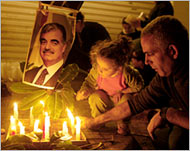Al-Hariri murder probe implicates Syria
There is converging evidence of both Syrian and Lebanese involvement in the assassination of former Lebanese prime minister Rafiq al-Hariri, a UN investigation says.

Led by veteran German prosecutor Detlev Mehlis, the probe into the 14 February killing of al-Hariri has established “that many leads point directly towards Syrian security officials as being involved with the assassination”.
The report was handed over to UN Secretary-General Kofi Annan on Thursday morning, and Annan transmitted the report to the 15-nation Security Council and the Lebanese government on Thursday evening.
The report said it was well known that Syrian military intelligence had a pervasive presence in Lebanon at least until the withdrawal of Syrian forces in line with UN Security Council resolution 1559.
“Given the infiltration of Lebanese institutions and society by the Syrian and Lebanese intelligence services working in tandem, it would be difficult to envisage a scenario whereby such a complex assassination plot could have been carried out without their knowledge,” the report said.
 |
|
Rafiq al-Hariri’s killing triggered |
Because of this, it is now incumbent on Syria “to clarify a considerable part of the unresolved questions” facing investigators, the report said.
The Mehlis commission said its findings to date indicated that the truck bombing that killed al-Hariri and 20 others in the streets of Beirut was carried out by a group “with an extensive organisation and considerable resources and capabilities”.
Planned crime
The strongly worded report by Mehlis said the Syrian and Lebanese intelligence services kept tabs on al-Hariri before his assassination by wiretapping his phone, and there was evidence a telecommunications antenna was jammed near the scene of the car bomb that killed him.
“The crime had been prepared over the course of several months,” it said.
It cited Ahmad Abdel-Al, a member of the Ahbash group in Lebanon with strong historical ties to the Syrian authorities, as a significant figure in the assassination plot, as he had used his mobile phone with “all the important figures in this investigation”.
There were numerous contracts between Abdel-Al and Lebanese state security on the day of the blast, including Brigadier-General Faysal Rasheed, chief of state security in Beirut, and others, the report said.
Abdel-Al’s brother, Mahmoud Abdel-Al “made a call minutes
before the blast, at 1247 hours, to the mobile phone of Lebanese President Emile Lahoud”, it said.
Call to Lahoud
The report also said that Syrian officials including Foreign Minister Faruq al-Shara had sought to mislead its investigation.
“While the Syrian authorities, after initial hesitation, have cooperated to a limited degree … several interviewees tried to mislead the investigation,” the commission said in its report.
“The letter addressed to the commission by the foreign minister of the Syrian Arab Republic proved to contain false information,” it said.
|
“Given the infiltration of Lebanese institutions and society by the Syrian and Lebanese intelligence services working in tandem, it would be difficult to envisage a scenario whereby such a complex assassination plot could have been carried out without their knowledge” UN probe report |
The report said a Syrian witness living in Lebanon who claimed to have worked for Syrian intelligence in Lebanon told the commission that “senior Lebanese and Syrian officials decided to assassinate Rafiq al-Hariri” about two weeks after the UN Security Council adopted a resolution in September 2004 demanding the withdrawal of Syrian forces from Lebanon.
The witness, who was not identified, claimed a senior Lebanese security official went to Syria several times to plan the crime. At the beginning of January 2005, a high-ranking Syrian officer posted in Lebanon told the witness that “Hariri was a big problem to Syria”.
“Approximately a month later the officer told the witness that there soon would be an ‘earthquake’ that would re-write the history of Lebanon,” the report said.
UN probe
UN Secretary-General Kofi Annan gave the probe a three-month mandate when it began its work on 16 June but said it could be extended for three more months if necessary. In August, Mehlis received an extension beyond the original 15 September deadline.
Mehlis said the investigation is not complete and must be
continued with Lebanese judicial and security authorities
in the lead.
Al-Hariri’s death led to demonstrations against Syria and magnified the international pressure on Damascus to withdraw its troops, which it eventually did. The Security Council approved a probe into al-Hariri’s assassination on 8 April.